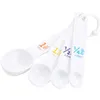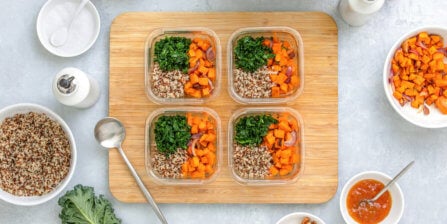Planning & Prep
12 Best Substitutes for Eggs in Baking

Ever run out of eggs mid-recipe or need a quick swap for dietary reasons? Don’t let an empty egg carton or a food sensitivity stop you from enjoying delicious baked treats! There are tons of creative substitutes for eggs in baking that work like a charm.
From classic go-tos like applesauce and yogurt to surprising options like chia seeds and aquafaba (trust us, it’s magical!), we’ve got you covered. Explore 12 of the best egg replacements that will keep your cakes fluffy, cookies chewy and brownies fudgy.
1. Ground flaxseed

Ground flaxseed, also known as flax or flaxseed meal, is a fantastic plant-based substitute for eggs. When mixed with water, it creates a gel-like texture that works similarly to eggs in binding ingredients together, adding moisture and even a bit of fluff to your baked goods. Flaxseed is a favorite among vegan bakers and those looking for a nutrient boost, as it’s packed with fiber, omega-3 fatty acids and antioxidants.
How to prepare: To make a “flax egg,” mix 1 tablespoon of ground flaxseed with 3 tablespoons of water. Let it sit for about five minutes until it thickens to a gooey, egg-like consistency.
How much to use: One flax egg (1 tablespoon flaxseed + 3 tablespoons water) equals one large egg. Use it in recipes for cookies, muffins, pancakes and other baked goods where binding is key.
2. Chia seeds

Chia seeds are a versatile and popular egg replacement in baking, especially for recipes that need a bit of binding and moisture. When mixed with water, chia seeds form a gel similar to flaxseed, providing structure and extra fiber to your baked goods. This substitute is ideal for cakes, muffins, brownies and even some breads, as it can help create a slightly chewy texture.
How to prepare: To make a “chia egg,” combine 1 tablespoon of chia seeds with 3 tablespoons of water. Let the mixture sit for about five to 10 minutes or until it thickens to a jelly-like consistency.
How much to use: One chia egg (1 tablespoon chia seeds + 3 tablespoons water) equals one large egg. This substitution works especially well as an egg substitute for baking brownies or cookies, adding a subtle nutty flavor and a little extra texture.
3. Applesauce

Applesauce is a great substitute for eggs in cake and other baked goods thanks to its natural moisture and mild sweetness. It helps bind ingredients, making it especially useful in recipes like cakes, muffins and brownies where you want a soft, tender texture. Plus, it’s a low-fat alternative, which can lighten up your treats a bit.
How to prepare: Look for unsweetened applesauce to avoid adding extra sugar to your recipe. You can also make homemade applesauce at home by cooking down apples and pureeing them until smooth.
How much to use: For one large egg, use 1/4 cup of applesauce. This swap works particularly well in cake mix recipes and can even help enhance box cakes by adding a touch of natural sweetness and moisture.
4. Mashed banana

Mashed banana is a simple, fruity substitute for eggs in your sweet treats. Its natural sugars add sweetness and moisture, helping bind ingredients and keep baked goods tender. This option is great in recipes where a slight banana flavor complements the dish, like muffins, pancakes, brownies or cookies.
How to prepare: Simply mash a ripe banana with a fork until it’s smooth. The riper the banana, the sweeter and softer it will be, making it easier to blend into your batter. In some recipes, you can even use it as a butter substitute.
How much to use: Use 1/4 cup of mashed banana to replace one large egg. While it’s best in moist, dense recipes, it can add a fun twist to birthday cake recipes or give boxed treats a fruity flavor upgrade.
5. Yogurt

Yogurt makes a great option when you’re figuring out how to replace eggs in baking, especially in recipes that need a rich, creamy texture. It works as a binder and provides moisture, keeping cakes, muffins and brownies soft and tender. Plain yogurt is best to avoid altering the flavor too much, but Greek yogurt can add extra thickness and richness.
How to prepare: No special prep is needed — just scoop and add it to your recipe. Choose unsweetened plain yogurt to keep your flavors balanced.
How much to use: Use 1/4 cup of yogurt to replace one large egg. Yogurt works especially well in cakes and breads.
6. Buttermilk

Buttermilk is an excellent choice as an egg substitute for adding moisture and a tender texture to baked goods. Its slight acidity also helps activate baking soda or baking powder, giving your treats a bit of extra lift. This makes it a great option for cakes, muffins and quick breads, where it can create a light, fluffy crumb.
How to prepare: If you don’t have buttermilk on hand, you can easily make it by adding 1 tablespoon of lemon juice or vinegar to 1 cup of milk and letting it sit for a few minutes until it thickens slightly.
How much to use: Replace one large egg with 1/4 cup of buttermilk. This swap works best in recipes where you need extra moisture.
7. Arrowroot powder

Arrowroot powder is a popular egg substitute in baking, especially for recipes that need a smooth binding agent without adding extra flavor. This starchy powder is often used in gluten-free and vegan baking to help bind ingredients and add structure. It works well in cookies, muffins and cakes, making it a versatile option when eggs are off the table.
How to prepare: Mix 2 tablespoons of arrowroot powder with 3 tablespoons of water to replace one egg. Stir until smooth to create a thick, gel-like consistency.
How much to use: For one large egg, use the 2 tablespoons of arrowroot powder plus 3 tablespoons of water mixture. Because arrowroot is relatively flavorless, it’s a great option for light cakes or other recipes where you don’t want to alter the taste of your treats.
8. Sweetened condensed milk

Sweetened condensed milk is a rich, thick option that can replace eggs in many baked goods, particularly sweet recipes. Its thick consistency adds moisture and binding properties, while the sweetness enhances the flavor. It’s especially great for cookies, cakes and pies, where the added sugar won’t overpower the taste.
How to prepare: Simply use it as is — no need for any additional preparation. Just replace eggs with the condensed milk in your recipe.
How much to use: Use 1/4 cup of sweetened condensed milk to replace one large egg.
9. Silken tofu

Silken tofu is a fantastic egg substitute that adds moisture and density to baked goods without changing the flavor. Its smooth texture works well in denser recipes like brownies, muffins and certain cakes. Since tofu doesn’t add any sweetness, it’s ideal for recipes where you want the other flavors to shine.
How to prepare: Blend or mash 1/4 cup of silken tofu until it’s completely smooth, removing any lumps to keep your batter even.
How much to use: To replace one large egg, use 1/4 cup of pureed silken tofu. This is a great option if you’re looking for a protein boost and works well in rich, moist desserts like brownies or silken tofu chocolate mousse.
10. Aquafaba

Aquafaba, the liquid from a can of chickpeas, is a surprising but effective egg substitute, especially for recipes that require whipped egg whites like meringues, mousses or macarons. Aquafaba can be whipped into stiff peaks, making it a great binder and leavening agent in airy desserts or light cakes.
How to prepare: Drain the liquid from a can of chickpeas and use it as is. For recipes that call for whipped egg whites, beat the aquafaba with a hand mixer until it forms soft or stiff peaks.
How much to use: Use 3 tablespoons of aquafaba to replace one large egg. It’s a unique substitute that works best for recipes that rely on egg whites for volume and texture.
11. Water, oil and baking powder

A combination of water, oil and baking powder can mimic the binding and leavening properties of eggs. This trio is ideal for cookies, cakes and muffins, where it helps add moisture and a little lift.
How to prepare: Mix 2 tablespoons of water with 1 teaspoon of oil and 2 teaspoons of baking powder to create a smooth blend.
How much to use: This mixture replaces one large egg. It’s a versatile swap that works in many baked goods, giving a light, fluffy texture without adding any extra flavor.
Grab it now on Instacart:
12. Carbonated water

Carbonated water is a quick, easy egg substitute that can add lightness to cakes, pancakes and other batter-based recipes. The bubbles in carbonated water act as a leavening agent, helping your baked goods rise and achieve a fluffy texture.
How to prepare: Simply measure out the carbonated water and add it directly to your batter. For best results, use freshly opened carbonated water to keep as many bubbles as possible.
How much to use: Use 1/4 cup of carbonated water to replace one large egg. This works well for recipes where a light, airy texture is key, like cakes or muffins.
Gather the ingredients you need for your next dessert recipe
Now that you’ve discovered the best substitutes for eggs in baking, it’s time to gather the rest of your ingredients. Whether you’re baking a cake, cookies or brownies, having everything ready will make the process smoother. Don’t forget — you may need to use a grams-to-cups converter to measure your ingredients correctly, especially if you’re working with new substitutes or alternative ingredients.
Ready to start baking without eggs? Head to Instacart and order everything you need, from yogurt to carbonated water. With same-day delivery, you can quickly get your supplies and jump straight into your next delicious dessert without missing a beat. Happy baking!
Most Recent in Planning & Prep

Planning & Prep
37 Care Package Ideas: From “Get Well” to “Just Because”
It’s always nice to show some extra appreciation for your loved ones. Whether you want to support a sick friend or a neighbor who had their first child, a care package is the perfect way…
Jan 30, 2025
Planning & Prep
Average Grocery Cost per Month: The 2025 Breakdown
The average grocery cost per month, per person, in the United States is roughly $350 for adults between 19 and 50 years old in a four-person household. This estimation depends on multiple factors, such as…
Dec 23, 2024
Planning & Prep
33 Shocking Global and National Food Waste Statistics (2025)
Did you know nearly 30% of the food produced globally is never eaten? This staggering food waste statistic highlights the alarming issue of uneaten food — a problem with environmental, economic and social consequences. Food…
Dec 23, 2024











 17 Grocery List Categories to Make Shopping Easy
17 Grocery List Categories to Make Shopping Easy  How to Meal Plan: Step-by-Step Guide to Meal Planning
How to Meal Plan: Step-by-Step Guide to Meal Planning  How To Read Food Labels: Guide to Nutrition Labels
How To Read Food Labels: Guide to Nutrition Labels 

